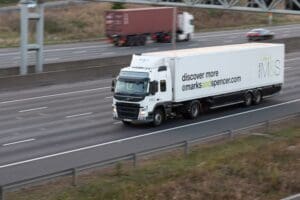Marks & Spencer has accelerated its drive towards net zero by rolling out a fleet of lorries fuelled by biomethane, a gas derived from waste such as food, animal manure and wastewater.
The retailer expects the biomethane-powered vehicles to help cut emissions by as much as 85% compared with diesel, while also offering significant cost savings.
Under the plan, M&S will add 50 new biomethane-fuelled lorries to support its food supply chain, ferrying ingredients and products between warehouses. A further 30 vehicles will be deployed to distribute the company’s clothing and homeware ranges. Once fully operational, nearly 10% of M&S’s entire transport fleet will be low-emission.
This latest initiative builds on M&S’s commitment to hit net zero across its own operations by 2030, and for its wider supply chain by 2040. Last year, the retailer invested £1m in reducing harmful emissions from dairy cows by altering their feed, cutting greenhouse gases by an estimated 11,000 tonnes.
UK businesses face growing pressure from both government and opposition parties to step up environmental efforts. Labour has vowed to reinstate a ban on the sale of new petrol and diesel cars by 2030, while ministers are considering a new levy on retailers and manufacturers that use plastic packaging instead of paper or cardboard.
Transport minister Lilian Greenwood has welcomed M&S’s move, calling it an example of how British companies can “lead the charge towards innovative zero-emission vehicles.” Julian Bailey, head of group transport at M&S, emphasised the retailer’s focus on reducing carbon, saving energy and improving overall operational efficiency as it adopts more green technologies.
